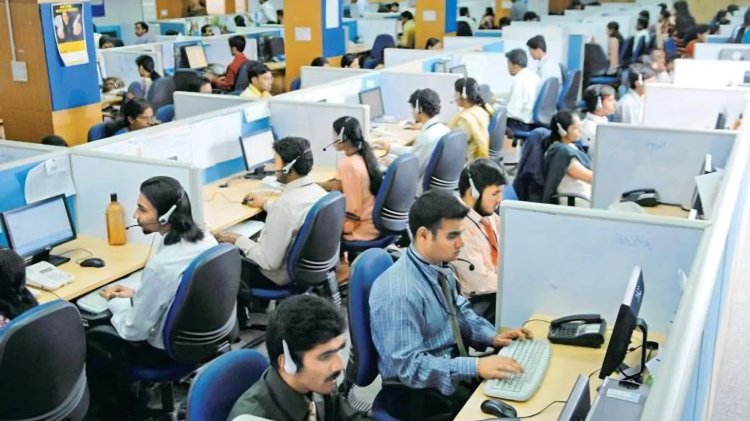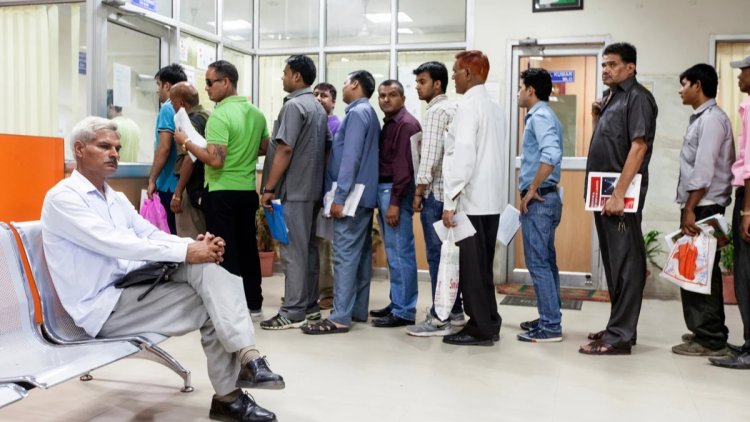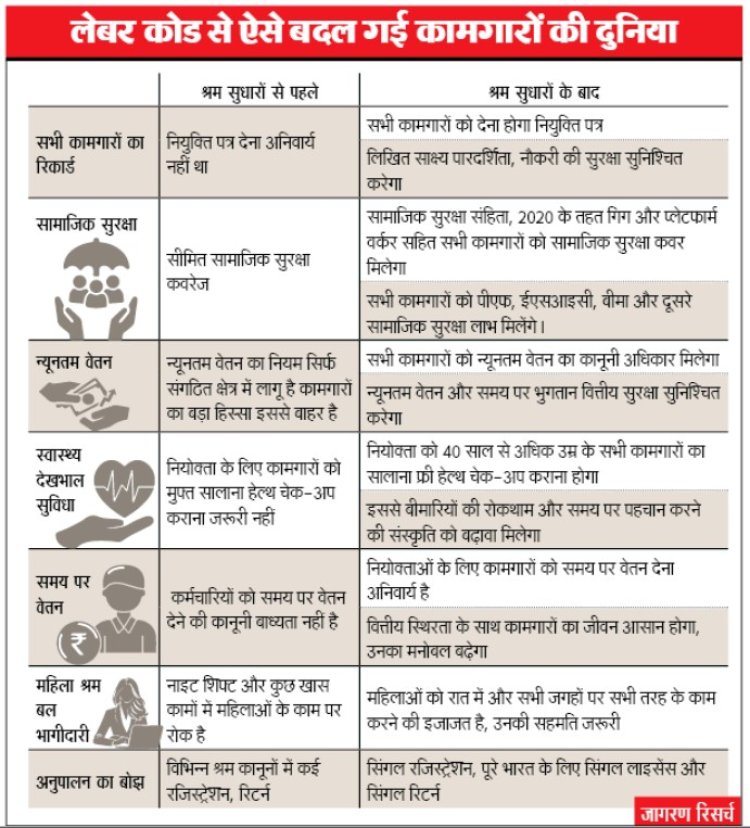New Labor Law Starts Today: 1-Year Gratuity, Contract Worker Pay Scale, and Double Overtime Pay.
The central government has taken a major step toward labor reforms by implementing four labor codes. These reforms include social security for gig workers, appointment letters for all employees, and permanent employment for contract workers. The five-year requirement for gratuity is no longer in place, and rules for overtime payment have also been changed. Women's safety and minimum wages have also been guaranteed.

Highlights
- Social security for gig workers
- Entitlement to gratuity within one year
- Guaranteed minimum wage
Taking a major step towards labor reforms, the Central Government has issued a notification implementing the four Labor Codes passed by Parliament five years ago.
It includes important provisions for the welfare of workers, including gig workers, such as providing universal social and health security, mandatory appointment letters for all employees, and providing limited-term contract workers with the same benefits as permanent employees.
Not only this, but now there will no longer be a minimum requirement of five years of service for gratuity; instead, an employee will be eligible for gratuity benefits after just one year of service. The Labor Code includes several changes that benefit both workers and companies, including rules regarding overtime payment.
A Modern Framework for a Future-Ready Workforce
This mandates timely minimum wages for workers across all sectors, along with double pay for overtime hours. These reforms include protections for women, including night-shift exemptions, free mandatory annual medical checkups for every worker over 40, and a single registration, licensing, and returns system.

Amidst the long-standing hurdle in implementing the Labour Code due to opposition from various labour organisations and many states, it is believed that in view of the economic challenges posed by the ongoing tariff war with America, the government has decided to take bold steps on labour reforms.
Domestic and foreign companies advocating for labor reforms are likely to see a significant increase in their investments after the new labor code comes into effect.
These measures implemented are as follows.
- Code on Wages (2019)
- Industrial Relations Code (2020)
- Code on Social Security (2020)
- Occupational Safety, Health and Working Conditions (OSHWC) Code (2020)
The ecosystem will change with the well-being of workers.
Calling this a historic decision, the Ministry of Labor stated that these four codes are replacing 29 existing labor laws. The goal is to create a strong workforce by aligning the labor ecosystem with the changing world while ensuring the well-being of workers. Advancing labor reforms for a self-reliant India is the need of the hour.

The government clearly states that existing labor laws are both barriers and fail to adapt to the changing economy and changing employment patterns. The new labor code strengthens both workers and companies, creating a workforce that is safe, productive, and adapts to the changing world of work.
Benefits of these benefits
The new labor code entitles fixed-term employees to equal pay, leave, medical care, and social security as permanent employees, and gratuity after just one year instead of five.

For the first time, the Labor Code defines "gig work," "platform work," and "aggregators," providing social security for all gig workers. Aggregators will be required to contribute one to two percent of their annual turnover.
The Universal Account Number (UAN) for gig workers will be portable, and their account will remain the same regardless of the state they work in. Protections for women workers include the exemption for night shifts in all sectors, ensuring equal pay for equal work, and allowing them to include their parents-in-law in the family definition.
Double pay for overtime hours
A minimum wage guarantee, mandatory appointment letters, and paid leave payments during holidays have been made mandatory to prevent exploitation. Working hours are set at 8-12 hours per day and 48 hours per week, with double pay for overtime hours. Beedi and cigar workers are eligible for bonuses only after working 30 days a year.

Plantation workers, audio-visual and digital media workers, electronic media journalists, dubbing artists, and stunt performers, including digital and audio-visual workers, have also been included in the new labor code to benefit them. Standards for social security and on-site safety monitoring have been set for workers in hazardous industries, including mine workers.
Textile Industry, IT and ITES Workers Also Covered
Textile industry, IT and ITES workers, and workers in the ports and export sector have also been covered. Their wages must be paid by the seventh of every month. Now, employees will be eligible for annual leave only after working 180 days in a year.
Implementing the Inspector-cum-Facilitator System and the Shifting System emphasizes guidance, awareness, and compliance support rather than punitive action. The labor code emphasizes speedy dispute resolution, with a two-member Industrial Tribunal, and the option to proceed directly to the Tribunal after conciliation.
A single registration, single license, and single return for companies will replace multiple overlapping filings. The National OSH Board will set uniform safety and health standards across all sectors. Safety committees will be mandatory in facilities with more than 500 workers, improving accountability. Regulatory burdens for smaller units will be reduced.
A Kerala court turns down a request to capture Arikomban, a wild elephant.
What will change with the Labor Code?

- Appointment letters mandatory for all workers.
- Strengthening transparency and formalization.
- Universal social security coverage, including gig and platform workers, PF, ESIC, insurance, and other benefits.
- Legal right to minimum wages for all workers, replacing the previous limited, scheduled-industry framework.
- Free annual health check-ups for workers over 40, promoting preventive healthcare.
- Timely payment of salaries mandatory, eliminating arbitrary or delayed payment practices.
- Women allowed to work night shifts in all sectors, including mining and hazardous industries, with safety measures and consent.
- ESIC coverage across India, including in small and hazardous areas.
- Single registration, license, and return, which will significantly reduce compliance burden.
Government of India ने IndiaAI मिशन के तहत निःशुल्क "YUVA AI For All" Course शुरू किया.













